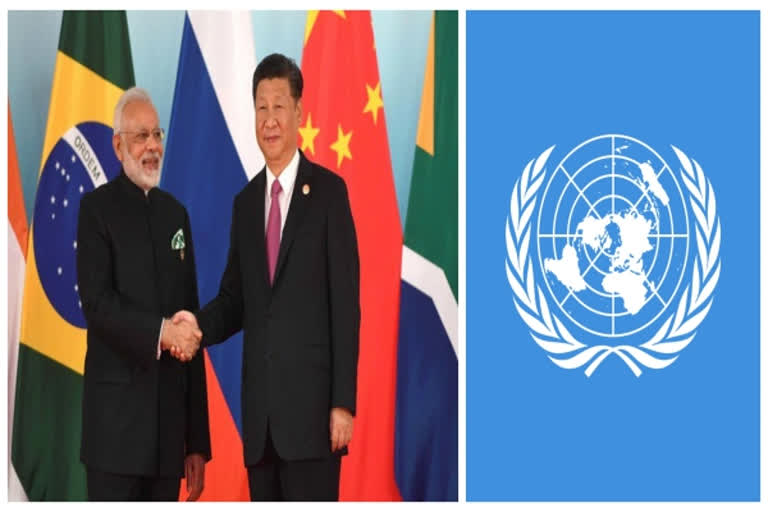Hyderabad: Since 21 December 1971, “The India-Pakistan Question” had been dormant in the UN Security Council (UNSC). On 16 August 2019, the People’s Republic of China (PRC) surprised the international community by reviving this issue for a closed-door discussion in the Council. Significantly, none of the other 14 members of the Council agreed to join the PRC in making the discussions public.
Two questions arise from China’s newfound multilateral activism. First, what is China’s interest in raising the “The India-Pakistan Question” five decades after it faded into the UNSC archives? Second, does China’s high-profile use of the UNSC signal a move to assert itself more vigorously on international peace and security issues? Both of these questions have a direct impact on India’s foreign policy.
On 1 January 1948, India had lodged her complaint in the UNSC regarding Pakistan’s armed aggression against her territorial integrity in Jammu and Kashmir. On 22 January 1948, India’s complaint was twisted by the United Kingdom (UK), using its privileges as a permanent member of the UNSC, into “The India-Pakistan Question.” This description of India’s complaint diluted its focus on aggression. It opened the door for illegally applying the UK’s “two-nation theory” of Partition of British India to the former kingdom of Jammu and Kashmir. India was not in the UNSC when the decision was taken.
The Republic of China (ROC) held China’s seat as a self-selected permanent member of the UNSC from 26 June 1945 till 25 October 1971. During this period, the UNSC adopted 17 resolutions on “The India-Pakistan Question”. The ROC did not play an active role in these resolutions.
On 25 October 1971, UN General Assembly resolution 2578 unseated the ROC from the UN and gave China’s seat in the UN to the PRC. India was among the 76 countries (out of 128) that voted for the resolution. The PRC took an activist position on “The India-Pakistan Question” in the UNSC during the December 1971 India-Pakistan conflict. It vociferously criticized India’s “aggression” resulting in the independence of Bangladesh in December 1971.
On 25 August 1972, the PRC cast its first veto in the UNSC to oppose the admission of newly independent Bangladesh into the UN. The UNSC (including the PRC) adopted its 18th (and last) resolution on “The India-Pakistan Question” on 21 December 1971. The resolution focused on three issues – the ceasefire in Bangladesh, the treatment of Pakistani soldiers taken as prisoners of war, and stability along the cease-fire line between India and Pakistan. India conveyed to the Council that it would address these issues through bilateral discussions with Pakistan.
On 2 July 1972, India and Pakistan signed their bilateral Treaty (Simla Agreement). Under Article 102 of the UN Charter, the Treaty was registered in the UN Treaty Database (Number 12308, Volume 858). The Treaty stipulates the legal obligations of both India and Pakistan to resolve their disputes bilaterally. This Treaty is the applicable law for the UNSC today, effectively rendering earlier UNSC resolutions on “The India-Pakistan Question” redundant.
China’s main interest in reviving “The India-Pakistan Question” lies in keeping possession of the approximately 43,000 sq. kms (including 5,180 sq kms handed over by Pakistan in 1963) it occupies of India’s territory in Jammu and Kashmir. This territory is integral to China’s flagship “China Pakistan Economic Corridor” (CPEC) project, connecting China to the Arabian Sea/western Indo-Pacific region. India’s domestic legislation on Jammu and Kashmir of 5 August 2019 is seen by China as a potential threat to its continued occupation of Indian territory.
China’s initiative on “The India Pakistan Question” to project its power as an “activist” permanent member of the UNSC faces challenges posed by the reality of polarization among the world’s major powers and an ineffective UNSC. As the only Asian permanent member, China has failed to maintain international peace and security on existing Asian UNSC agenda issues like Afghanistan, Iran, Iraq, Palestine, Yemen and Syria.
India was the first non-socialist country to extend de jure recognition to the PRC on 30 December 1949. China officially acknowledges the leading role played by India in seeking “the restoration of the lawful rights” of the PRC in the UN since 1950. The irony of China’s initiative on “The India-Pakistan Question” cannot be lost on India.
- Asoke Mukerji, Former Ambassador and Permanent Representative of India to the United Nations



